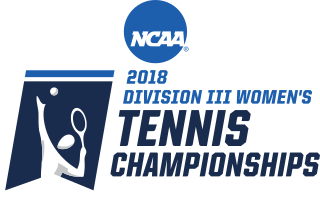Related Research Articles
The Women's College World Series (WCWS) is the final portion of the NCAA Division I softball tournament for college softball in the United States. The eight teams of the WCWS play a double-elimination tournament until just two teams remain. These two teams compete in a best-of-three series to determine the Division I WCWS National Champion. Previous WCWS losses do not factor into the best-of-three championship series, and the first team to win two of three games is declared the National Champion.

The Association for Intercollegiate Athletics for Women (AIAW) was a college athletics organization in the United States, founded in 1971 to govern women's college competitions in the country and to administer national championships. It evolved out of the "Commission on Intercollegiate Athletics for Women" (CIAW), founded in 1967. The association was one of the biggest advancements for women's athletics on the collegiate level. Throughout the 1970s, the AIAW grew rapidly in membership and influence, in parallel with the national growth of women's sports following the enactment of Title IX.
The Association for Intercollegiate Athletics for Women was founded in 1971 to govern collegiate women's athletics and to administer national championships. During its existence, the AIAW and its predecessor, the Division for Girls' and Women's Sports (DGWS), recognized via these championships the teams and individuals who excelled at the highest level of women's collegiate competition.

The NCAA Division II women's basketball tournament is an annual tournament to determine the National Collegiate Athletic Association (NCAA) Division II women's college basketball national champion. Basketball was one of 12 women's sports added to the NCAA championship program for the 1981–82 school year, as the NCAA and Association for Intercollegiate Athletics for Women (AIAW) sought for sole governance of women's collegiate athletics. The AIAW continued to conduct its established championships; however, after a year of dual women's championships at the national level, the AIAW disbanded.

College lacrosse is played by student-athletes at colleges and universities in the United States and Canada. In both countries, men's field lacrosse and women's lacrosse are played at both the varsity and club levels. College lacrosse in Canada is sponsored by the Canadian University Field Lacrosse Association (CUFLA) and Maritime University Field Lacrosse League (MUFLL), while in the United States, varsity men's and women's lacrosse is governed by the National Collegiate Athletic Association (NCAA), National Junior College Athletic Association (NJCAA) and National Association of Intercollegiate Athletics (NAIA). There are also university lacrosse programs in the United Kingdom sponsored by British Universities and Colleges Sport (BUCS) and programs in Japan.

The Cal State Fullerton Titans are the athletic teams that represent California State University, Fullerton.

The Sacramento State Hornets is the team that represents California State University, Sacramento in intercollegiate athletics.

Long Beach State athletics, or simply Beach athletics, are the athletic teams that represent California State University, Long Beach. Teams compete in 19 sports at the National Collegiate Athletic Association (NCAA) Division I level. Long Beach State is a founding member of the Big West Conference, and also competes in the Mountain Pacific Sports Federation and the Golden Coast Conference for sports not sponsored by the Big West.
The Cal State East Bay Pioneers are the athletic teams that represent California State University, East Bay, located in Hayward, California, in intercollegiate sports as a member of the Division II level of the National Collegiate Athletic Association (NCAA), primarily competing in the California Collegiate Athletic Association (CCAA) for most of their sports since the 2009–10 academic year; while its women's water polo teams compete in the Western Water Polo Association (WWPA). The Pioneers previously competed in the California Pacific Conference of the National Association of Intercollegiate Athletics (NAIA) from 1998–99 to 2008–09.

The NCAA Division I Women's Tennis Championship is the National Collegiate Athletic Association's tennis tournament to determine the Team Championships, Singles Championships, and Doubles Championships for women's tennis athletes from Division I institutions. Tennis was one of twelve women's sports added to the NCAA championship program for the 1981–82 school year, as the NCAA engaged in battle with the Association for Intercollegiate Athletics for Women for sole governance of women's collegiate sports. The AIAW continued to conduct its established championship program in the same twelve sports; however, after a year of dual women's championships, the NCAA outlasted the AIAW to gain sole authority over women's sports.

The NCAA Division II Women's Tennis Championship is the National Collegiate Athletic Association's annual tennis tournament to determine the team champions of women's collegiate tennis from Division II institutions in the United States.

The NCAA Division III Women's Tennis Championship is the annual tennis tournament hosted by the National Collegiate Athletic Association (NCAA) to determine the team, singles, and doubles champions of Division III in women's collegiate tennis.
The annual NCAA Division I Women's Lacrosse Championship tournament has determined the top women's lacrosse team in the NCAA Division I since 1982. The Maryland Terrapins are the most successful team with fourteen titles. The most recent championship was won by Boston College.

The NCAA Division I women's volleyball tournament is an annual event that leads to the championship in women's volleyball from teams in Division I contested by the NCAA each winter since 1981. Texas won the most recent tournament, defeating Nebraska 3–0 at Amalie Arena in Tampa, Florida.

The NCAA Division II women's volleyball tournament is the annual event that decides the championship contested by the NCAA. It determines the national champion of Division II women's collegiate volleyball. It has been held annually since 1981, typically played in December after the fall regular season.

The NCAA Division III women's volleyball tournament is the annual event that decides the championships in women's volleyball from teams in Division III contested by the NCAA each winter since 1981 except in 2020, when all D-III championship events were canceled due to COVID-19.

The NCAA Fencing Championships are awarded at the annual tournament held in March to determine the NCAA's national collegiate individual and team championships in fencing. Individual champions are determined by performance during the NCAA fencing team championship competition. Unlike most NCAA sports, the fencing championship is a single National Collegiate championship rather than being split into divisions.

The NCAA women's gymnastics tournament is an annual gymnastics competition to determine the best collegiate women's gymnastics team in the country. Unlike most NCAA sports, the women's gymnastics championship is not separated into divisions and uses a single National Collegiate tournament instead.

The NCAA Division II Softball Championship is the annual tournament hosted by the NCAA to determine the national champion of women's college softball among Division II members in the United States and Canada. The final rounds of the tournament are also referred to as the NCAA Division II Women's College World Series. The tournament has been held annually since 1982.

The NCAA Division III softball tournament is the annual tournament hosted by the National Collegiate Athletic Association to determine the team champion of women's college softball among its Division III programs in the United States. The final portion of the tournament is also called the Division III Women's College World Series.
